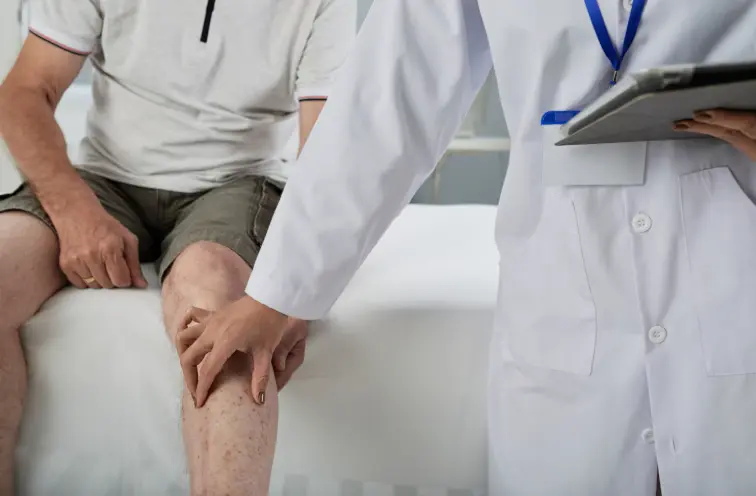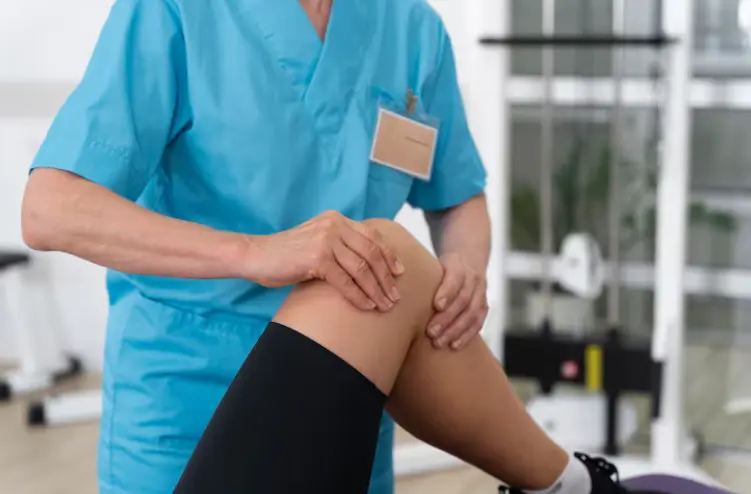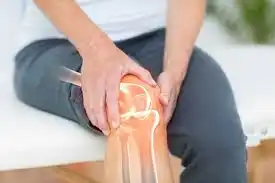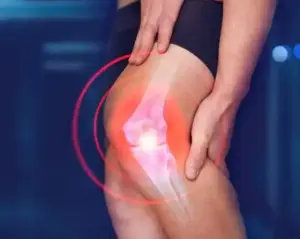Advanced Total Knee Replacement Treatment
Total knee replacement surgery to relieve chronic knee pain, restore mobility, and improve quality of life with advanced surgical techniques and expert care.

Total Knee Replacement (TKR), also known as knee arthroplasty, is a highly effective surgical procedure designed to replace a damaged knee joint with a prosthetic implant. The surgery involves removing the damaged portions of the knee joint — including the femur (thigh bone), tibia (shin bone), and sometimes the patella (kneecap) — and replacing them with artificial components made of metal, plastic, and ceramic materials.
TKR is primarily recommended for individuals suffering from severe knee pain, reduced mobility, or joint deformities caused by conditions like osteoarthritis, rheumatoid arthritis, or traumatic injury. This procedure helps alleviate pain, restore function, and improve the quality of life for individuals who experience debilitating knee problems.
The goal of Total Knee Replacement is to restore knee function and alleviate pain so that patients can resume everyday activities such as walking, climbing stairs, and performing physical tasks with reduced discomfort.

Early Detection Saves Lives
Early detection and treatment are crucial for improving the chances of survival. If you notice any concerning symptoms, consult a healthcare provider immediately.
Signs and Symptoms
Severe Knee Pain
Chronic knee pain that doesn’t improve with rest, medications, or physical therapy is one of the most common signs of joint degeneration. This pain may worsen with activity and affect sleep.
Reduced Mobility
Difficulty walking, bending, or standing for long periods is a clear sign that the knee joint has become damaged and is no longer functioning optimally.
Knee Stiffness
If your knee feels stiff, or you have difficulty straightening it fully, it may indicate significant joint damage.
Swelling and Inflammation
Persistent swelling and inflammation around the knee joint, especially after physical activity, is a symptom of inflammation or degenerative changes in the knee.
Instability or Weakness
A feeling of instability or the knee "giving way" during movement is a sign of significant damage to the knee joint.
Blood in Urine
Hematuria - pink, red, or dark urine, the most common symptom
Frequent Urination
Feeling the need to urinate frequently, even when bladder is not full
Painful Urination
Experiencing pain or burning sensation while urinating
Back or Pelvic Pain
Pain that occurs as the cancer grows and spreads
Unexplained Weight Loss
Significant weight loss not related to diet or exercise
Fatigue
Feeling unusually tired or weak without a clear cause
Meet Our Expert Total Knee Replacement Specialists
Risk Factors for Total Knee Replacement
Smoking
Smoking is one of the leading causes of bladder cancer. Chemicals in tobacco smoke can damage the lining of the bladder, increasing the risk.

Gender
Men are at a higher risk of developing bladder cancer than women.

Chronic Bladder Infections or Inflammation
Conditions such as bladder infections and long-term bladder inflammation can increase the risk.

Exposure to Chemicals
Prolonged exposure to certain chemicals, especially those used in the dye industry, rubber production, and chemical manufacturing, increases the risk.

Age
As you age, the knee joints naturally undergo wear and tear. Older individuals are more likely to need TKR due to age-related degenerative conditions like osteoarthritis.

Osteoarthritis
The most common cause for TKR, osteoarthritis occurs when the cartilage in the knee joint wears away, leading to pain, stiffness, and loss of mobility.

Rheumatoid Arthritis
An autoimmune disorder that causes chronic inflammation in the joints can lead to significant knee damage and may require surgery.

Previous Knee Injuries
Past knee fractures, ligament tears, or meniscus damage can lead to long-term knee issues, increasing the risk of needing TKR.

Obesity
Excess body weight puts additional stress on the knee joints, accelerating wear and tear and increasing the need for knee replacement surgery.

Genetics
Family history plays a role in joint health, and some people may inherit conditions that make them more prone to developing knee problems.

Sedentary Lifestyle
Lack of physical activity can lead to weak muscles around the knee joint, which contributes to joint deterioration.

Advanced Cancer Treatment Options
Diet and Nutrition
Prevention
Diagnosis
Key Services
Key Facilities
A healthy diet plays a vital role in maintaining joint health and promoting recovery after Total Knee Replacement surgery:
- Calcium and Vitamin D: These nutrients are crucial for bone health. Calcium-rich foods like dairy products, leafy greens, and fortified cereals, combined with Vitamin D from sunlight and fortified foods, support bone strength.
- Protein-Rich Foods: Protein helps with tissue repair and recovery after surgery. Foods like lean meats, fish, eggs, legumes, and dairy products provide essential protein for muscle and tissue rebuilding.
- Anti-Inflammatory Foods: Incorporate foods rich in omega-3 fatty acids (salmon, flaxseeds, walnuts) and antioxidants (berries, spinach, tomatoes) to help reduce inflammation in the knee joint.
- Hydration: Staying hydrated is key for overall health and facilitates the healing process. Aim to drink plenty of water daily to support recovery.
- Weight Management: Maintaining a healthy weight reduces stress on the knee joint, especially post-surgery. A balanced diet with fruits, vegetables, and whole grains helps manage weight.
While not all risk factors can be avoided, there are several ways to reduce the risk of needing Total Knee Replacement:
- Exercise Regularly: Low-impact exercises like swimming, cycling, and walking can strengthen the muscles around the knee and improve joint stability without putting excessive strain on the joint.
- Maintain a Healthy Weight: Reducing excess weight decreases the pressure on the knee joints, preventing unnecessary wear and tear and reducing the likelihood of arthritis.
- Protect Your Knees: Use proper techniques during physical activity to avoid injury. Always warm up before exercise and avoid excessive stress on the knees during high-impact activities.
- Stretching and Flexibility: Regular stretching exercises can improve flexibility in the knee joint and prevent stiffness.
- Prevent Knee Injuries: Be cautious of falls, and if you’re involved in sports, use protective gear to minimize the risk of knee injuries.
- Ergonomic Considerations: Pay attention to your posture and ergonomics when sitting, standing, and performing daily activities to avoid unnecessary strain on your knees.
A thorough evaluation by a healthcare provider is required to determine if Total Knee Replacement is necessary:
- Physical Examination: The doctor will assess your knee’s range of motion, strength, alignment, and stability, as well as any signs of swelling or deformity.
- X-Rays: X-rays are essential for visualizing the extent of joint damage, cartilage loss, and deformities. They help determine whether the knee is suitable for replacement surgery.
- MRI or CT Scans: These imaging techniques provide a detailed look at the knee joint and surrounding tissues, which can be helpful in cases where additional information is required.
- Blood Tests: Blood tests may be ordered to rule out infection or inflammation, though these are not usually the primary diagnostic tool for knee replacement.
Once the diagnostic tests are complete, the healthcare provider will recommend a treatment plan, which may include Total Knee Replacement if the joint damage is severe.
In a hospital or clinic that provides Total Knee Replacement, several services are available to ensure a smooth surgical experience:
- Pre-Operative Consultation: This includes a comprehensive assessment of your medical history, diagnostic tests, and a discussion of the surgical process.
- Pain Management: Various techniques are used to manage pain, including nerve blocks, medications, and physical therapy to ensure comfort throughout the recovery process.
- Physical Therapy: A vital part of post-surgical rehabilitation, physical therapy helps restore function, strengthen muscles, and improve range of motion.
- Post-Operative Care: Monitoring and follow-up visits to ensure healing, prevent complications, and manage any issues related to the knee joint or prosthesis.
- Orthopedic Expertise: Highly trained orthopedic surgeons specialize in knee surgeries, providing expertise in the latest surgical techniques to ensure the best outcomes.
Hospitals and clinics offering Total Knee Replacement should be equipped with state-of-the-art facilities to ensure patient safety and comfort:
- Advanced Surgical Theaters: Equipped with modern tools and technologies, these theaters enable orthopedic surgeons to perform precise knee replacement surgeries.
- Rehabilitation Centers: On-site physical therapy services to assist patients with post-surgery recovery, strengthening, and mobility exercises.
- Recovery Rooms: Comfortable rooms for patients to rest post-surgery with attentive nursing care and monitoring.
- Orthopedic Units: Specialized departments focused on joint health, with expert surgeons, nurses, and physiotherapists dedicated to knee replacement patients.
- Post-Surgery Care Units: Facilities designed for monitoring and preventing complications such as blood clots or infections.
Top Medical Facilities at Our Multispeciality Hospital – Here’s What Makes Us Different!
Ready to Begin Your Total Knee Replacement Journey? – Expert Knee Care
Learn More About Total Knee Replacement Procedures
Frequently Asked Questions
The recovery time for Total Knee Replacement can vary. Patients typically begin walking with assistance within a few days. Full recovery, including regaining strength and mobility, may take 3 to 6 months. Physical therapy plays a crucial role in speeding up recovery and improving function after surgery.
Like any surgery, Total Knee Replacement carries risks such as infection, blood clots, nerve damage, or knee stiffness. However, these risks are minimized with proper pre-surgical care, modern surgical techniques, and post-operative monitoring. It’s essential to follow your doctor’s instructions to reduce the chances of complications.
A Total Knee Replacement can last anywhere from 15 to 25 years, depending on factors like age, activity level, and the materials used in the implant. Regular follow-up appointments are necessary to monitor the condition of the prosthesis and ensure it continues to function effectively.
